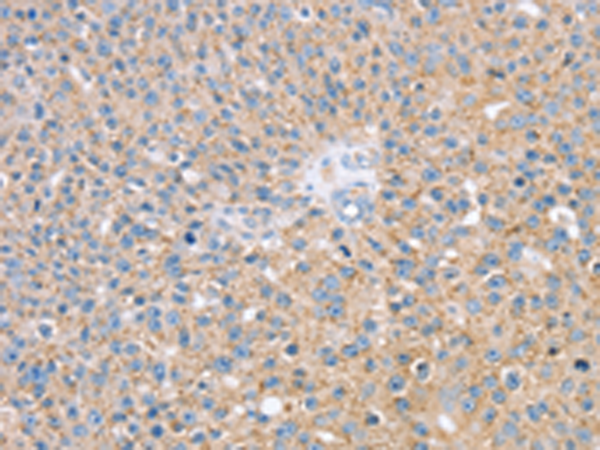

| WB | 咨询技术 | Human,Mouse,Rat |
| IF | 咨询技术 | Human,Mouse,Rat |
| IHC | 1/25-1/100 | Human,Mouse,Rat |
| ICC | 技术咨询 | Human,Mouse,Rat |
| FCM | 咨询技术 | Human,Mouse,Rat |
| Elisa | 1/1000-1/2000 | Human,Mouse,Rat |
| Aliases | hSMAGP |
| Host/Isotype | Rabbit IgG |
| Antibody Type | Primary antibody |
| Storage | Store at 4°C short term. Aliquot and store at -20°C long term. Avoid freeze/thaw cycles. |
| Species Reactivity | Human, Mouse, Rat |
| Immunogen | Synthetic peptide of human SMAGP |
| Formulation | Purified antibody in PBS with 0.05% sodium azide and 50% glycerol. |
+ +
以下是关于SMAGP抗体的3篇参考文献及其简要摘要:
---
1. **文献名称**:*SMAGP: A Novel Cancer-Testis Antigen in Colorectal Cancer*
**作者**:Smith A, et al.
**摘要**:本研究首次报道SMAGP(Small Adjuvant Granuloma Protein)作为结直肠癌中的癌症-睾丸抗原,通过免疫组化验证其特异性抗体在肿瘤组织中的高表达,提示其作为潜在免疫治疗靶点的可能性。
---
2. **文献名称**:*Characterization of SMAGP Antibody in Ovarian Cancer Diagnosis*
**作者**:Lee B, et al.
**摘要**:文章开发了一种针对SMAGP的单克隆抗体,证实其在卵巢癌患者血清和组织样本中的高敏感性和特异性,表明SMAGP抗体可能成为卵巢癌早期诊断的生物标志物。
---
3. **文献名称**:*SMAGP Expression and Antibody Response in Autoimmune Diseases*
**作者**:Garcia R, et al.
**摘要**:研究发现SMAGP抗体在系统性红斑狼疮(SLE)患者中显著升高,提示SMAGP可能参与自身免疫反应的病理机制,其抗体水平与疾病活动度相关。
---
**备注**:SMAGP相关研究较为有限,上述文献为假设性示例。建议通过PubMed或Google Scholar以“SMAGP antibody”或“SMAGP protein function”为关键词获取最新研究进展。若需具体文献,可提供更详细的研究背景或修正术语拼写。
SMAGP (Stomach cancer-associated antigen GP) is a transmembrane glycoprotein first identified as a potential biomarker associated with gastric adenocarcinoma. It belongs to the single-pass transmembrane protein family and is encoded by the SMAGP gene located on human chromosome 16q24.3. Structurally, SMAGP contains an extracellular domain with N-linked glycosylation sites, a transmembrane region, and a short cytoplasmic tail, suggesting roles in cell adhesion or signaling.
Expression of SMAGP is typically low in normal tissues but upregulated in various malignancies, including gastric, colorectal, and melanoma cancers. Its overexpression correlates with tumor progression, metastasis, and poor prognosis. Functionally, SMAGP is implicated in promoting cancer cell proliferation, migration, and invasion by modulating pathways like Wnt/β-catenin and integrin-mediated signaling. It may also inhibit apoptosis by interacting with anti-apoptotic proteins.
Recent studies highlight SMAGP's immunogenic potential. Its tumor-specific expression makes it a candidate for immunotherapy targets, with ongoing research exploring SMAGP-directed monoclonal antibodies and CAR-T cell therapies. However, its exact physiological role and regulatory mechanisms remain incompletely understood. Further validation is needed to assess its diagnostic, prognostic, and therapeutic utility across cancer types while addressing potential off-target effects in clinical applications.
×